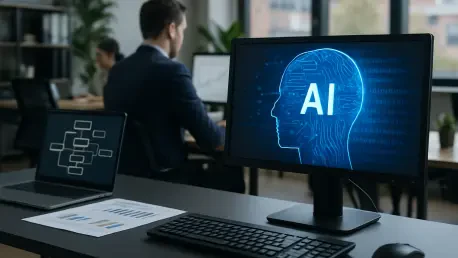What happens when a technology with the power to transform every aspect of work also ignites deep-seated fears among employees? In 2025, artificial intelligence (AI) is no longer a distant concept but a daily reality in offices worldwide, automating tasks, refining strategies, and reshaping roles. Yet, nearly 40% of workers still worry that AI could replace them, according to recent industry surveys. This tension between innovation and anxiety places HR leaders at the epicenter of a pivotal challenge: steering teams through AI adoption while preserving the human essence of work. This exploration uncovers how HR professionals are becoming indispensable guides in this technological shift.
Why AI Demands Attention in Workplaces Today
AI’s rapid integration into business operations marks a defining moment for modern organizations. From streamlining data analysis to powering customer service chatbots, AI tools are enhancing efficiency at an unprecedented scale. However, this surge in adoption also brings unease, as employees grapple with uncertainties about job security and relevance in an automated landscape. The urgency to address these concerns is evident, with digital transformation now a top priority for 85% of companies, per a 2025 global business report.
HR leaders find themselves uniquely positioned to navigate this complex terrain. Beyond implementing technology, their role involves interpreting its impact on people, ensuring that AI serves as a collaborator rather than a competitor. This balancing act requires not just technical know-how but a deep understanding of human dynamics, setting the stage for HR to lead with empathy and foresight.
The High Stakes of AI Adoption for Businesses
The implications of AI extend far beyond operational upgrades; they touch the very core of organizational survival. Companies that successfully integrate AI report a 30% increase in productivity, according to a 2025 study by a leading tech research firm. Yet, the flip side reveals a stark reality—firms that fail to adapt risk falling behind competitors or alienating their workforce due to poorly managed transitions.
Employee apprehensions about job displacement are not unfounded, with automation already reshaping roles in sectors like manufacturing and retail. HR’s challenge lies in transforming this narrative, ensuring that AI is seen as a tool to augment human capabilities rather than diminish them. By focusing on readiness and communication, HR can help organizations harness AI’s potential while safeguarding employee trust.
HR’s Critical Role in Reskilling for AI Mastery
HR professionals are stepping into a transformative role, reshaping how employees perceive and interact with AI. One key focus is altering mindsets—through targeted campaigns, HR can highlight success stories, such as a logistics company that boosted delivery planning by 25% using AI alongside human oversight. This reframing helps employees view AI as an ally that enhances their output.
Another vital area is skill-building, particularly in “intent shaping”—the ability to provide AI with clear, contextual instructions to yield meaningful results. This skill, akin to nuanced human dialogue, ensures AI tools deliver relevant insights, as seen in a financial firm where intent shaping improved forecasting accuracy by 20% after HR-led training. Such practical applications underscore the value of equipping teams with actionable competencies.
Beyond skills, HR must cultivate a culture of experimentation. Creating environments where employees can test AI tools without fear of repercussions fosters innovation and builds confidence. Safe spaces for trial and error, supported by HR initiatives, allow teams to learn from missteps and refine their approach, ensuring AI becomes a seamless part of daily workflows.
Real-World Perspectives on AI and Human Partnership
Insights from industry experts shed light on the practicalities of AI integration. Lola Babalola, Head of People at a prominent marketing tech firm, emphasizes, “AI amplifies human judgment, but only when guided by the right questions.” Her perspective highlights the necessity of critical thinking in leveraging AI, a skill HR must prioritize in training programs.
Field experiences further illustrate this dynamic. A software development team initially struggled with inconsistent AI outputs until HR organized workshops on crafting precise prompts, resulting in a 15% improvement in project timelines. Such examples demonstrate how HR’s intervention can bridge theoretical understanding and real-world application, making AI a tangible asset.
These voices and stories reinforce a central truth: AI’s success hinges on human readiness. HR’s role in facilitating dialogue, sharing learnings, and normalizing AI as a workplace tool proves essential in turning skepticism into engagement, ensuring employees feel empowered rather than threatened by technological change.
Actionable Strategies for HR to Champion AI Integration
To lead AI adoption effectively, HR professionals can adopt a structured approach starting with an AI readiness assessment. Surveying employee sentiments and identifying skill gaps provides a clear baseline, enabling targeted interventions. This data-driven step ensures resources are allocated where they’re most needed, addressing specific concerns.
Next, designing tailored learning programs is crucial, focusing on intent shaping and critical evaluation of AI outputs. Training should encourage questions like, “Does this result align with our goals?” to build discernment. Additionally, hosting “AI sandbox” sessions—dedicated times for teams to experiment with tools—can spark curiosity and uncover innovative uses, fostering a hands-on learning culture.
Finally, establishing feedback loops through regular check-ins allows HR to refine strategies and address emerging fears. This continuous dialogue ensures training evolves with employee needs, creating a workforce not just prepared for AI but eager to leverage it. These actionable steps position HR as the cornerstone of a successful AI transition, blending technical preparation with human-centric support.
Reflecting on HR’s Journey with AI
Looking back, HR leaders navigated uncharted waters as AI reshaped workplaces, turning potential disruption into opportunity. Their efforts in reframing perceptions, building critical skills, and fostering experimental cultures proved instrumental in aligning technology with human values. Each step taken addressed immediate fears while laying a foundation for long-term adaptation.
As organizations continue to evolve, HR must remain proactive, anticipating new challenges AI may bring. Prioritizing ongoing education and open communication will be key to sustaining momentum. By championing a mindset of growth and collaboration, HR ensured that teams not only adapted to AI but thrived alongside it, setting a precedent for future technological shifts.









